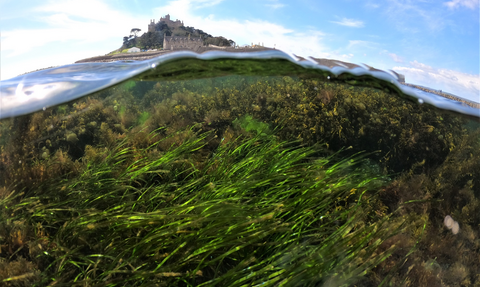
Your Shore Award
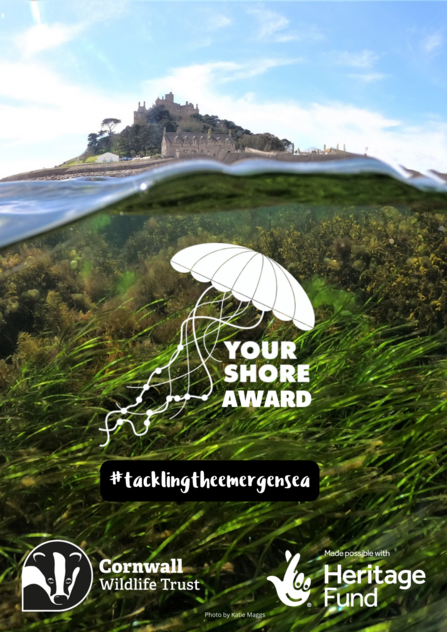
(c) Katie Maggs- Tonic of the Sea
What is the Your Shore Award?
Cornwall Wildlife Trust has created the Your Shore award for all ages and abilities to explore the world of wildlife conservation, to learn new skills, volunteer and even take the lead!
Anyone can complete the Award, in as little as a dedicated week or over several months. The Your Shore Award is also a great tool for community and volunteering groups to encourage more people to take action to tackle the climate and ecological crisis and gain valuable skills along the way.
The five challenges are really flexible so you can follow your own interests or work with others to find out what is available in your area (or online) to contribute to making the world a wilder place. Check out the drop down guides to the challenges (on this page) for what is involved and fantastic organisations or resources you can tap into to enrich your experience.
Where can you find the Award?
You can pick up a free copy of the Your Shore Award booklet for yourself or others by:
- Asking your local Your Shore marine group
- Emailing yourshore@cornwallwildlifetrust.org.uk
Download and print PDF
Your Shore Award: Print
Your Shore Award: Digital
The Five Challenges
The Your Shore Award is made up of five challenges:
Challenge 1: Skill up and learn about nature
Participate in at least two training sessions to increase your skills and knowledge, online or in person. You can find what interests you as long as these opportunities are about nature or the environment; this might be learning about different creatures or habitats, wilderness skills or how to campaign effectively.
Activity Ideas For Children and Young People
-
Learn to snorkel session with Cornwall Wildlife Trust and BSAC qualified instructors - *Click here to check Cornwall Wildlife Trust events listings.
- Exploring Conservation – Free online conservation courses with United for Wildlife and National Geographic.
- Learn how to help wildlife at school.
- Wildlife Watch activities learn how to build a den or create your own wildlife spotter guides. Use Wildlife Watch from The Wildlife Trusts to skill up on a wide range of things!
- Wildlife Watch learning resources Are you a teacher or youth worker wanting to expand your resources to teach young people about the natural world? Wild Watch has resources available for educators to use!
- RSPB has great ideas and resources to help kids and families connect with nature, from simple activities you can do at home or at school to wild clubs, fun articles and family-friendly reserves and events.
- Woodland Trust. Learn about Trees and wildlife with these outdoor learning resources.
- Surfers Against Sewage interactive online Ocean school.
*Search cornwallwildlifetrust.org.uk/events using the filters to search location and different categories. Just attending an event is a skill-up session if you are learning new things.
Activity Ideas For Adults
- Learn to snorkel session with Cornwall Wildlife Trust and BSAC qualified instructors - Check CWT events listings
- Natural History Museum Training opportunities.
- Wildlife Courses with Secret World Wildlife Rescue (some costs associated)
- Exploring Conservation – Free online conservation courses with United for Wildlife and National Geographic.
- Marine Mammal Medic for British Divers Marine Life Rescue (some costs associated) (18+).
- Woodland Trust. Learn about Trees and wildlife with these outdoor learning resources.
Search Cornwallwildlifetrust.org.uk/events using the filters to search location and different categories. Just attending an event is a skill up session if you are learning new things.
Activity Ideas For Groups
- Cornwall Plastic Pollution Coalition- Fun community and schools education programme.
- RNLI Water Safety Workshop
- Cornwall Climate Care Workshop (primary – KS5)
- Learn how to help wildlife at school
- Wildlife Watch activities learn how to build a den or create your own wildlife spotter guides. Use Wildlife Watch from The Wildlife Trusts to skill up on a wide range of things!
- Wildlife Watch learning resources Are you a teacher or youth worker wanting to expand your resources to teach young people about the natural world? Wild Watch has resources available for educators to use!
- Natural History Museum virtual workshops (some costs apply)
- Learning Resources | Natural History Museum
- Biffa workshops and resources to learn about recycling and waste management which can include a visit to one of their sorting centres.
- Woodland Trust. Learn about Trees and wildlife with these outdoor learning resources.
- WWF wildlife and conservation teaching resources and virtual events.
- RSPB great ideas and resources to help kids and families connect with nature, from simple activities you can do at home or at school, to wild clubs, fun articles and family-friendly reserves and events
- RSPB Teaching activities, resources and opportunities to help inspire pupils to experience and learn about nature.
- Surfers Against Sewage Ocean School resources.
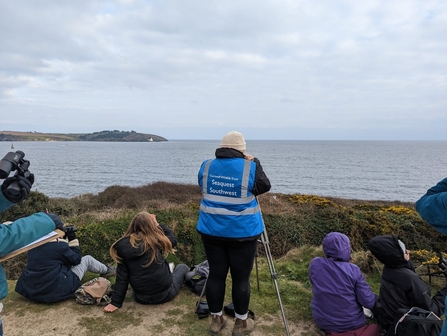
Challenge 2: Citizen Science – Collecting Information for Research
Become a citizen scientist by collecting data to help organisations solve real-world problems! This can be through local groups or events, online through websites such as The National History Museum or out using apps such as The Great Egg Case Hunt by The Shark Trust or BirdNet. Complete at least 4 hours of Citizen Science.
Citizen Science Projects for Children & Young People
- Land based Mega-fauna surveys with Seaquest Southwest
- Rocky Shore intertidal survey with Shoresearch Cornwall
- The Big Seaweed Search
- Natural History Museum citizen science opportunities
- Million Mile Beach Clean
Citizen Science Projects for Adults
- Land based Mega-fauna surveys with Seaquest Southwest.
- Become a Shoresearch Cornwall volunteer to carry out intertidal surveys of your local rocky shore and help create a snapshot of the biodiversity that thrives within it (16+).
- If you are a recreational diver or snorkeler looking for a new challenge, Seasearch offers an exciting way to learn about marine life whilst doing your bit to protect and restore our oceans (18+).
- Join the Marine Conservation Society on a plastic pollution beach clean to survey the litter found along our coast and help make real positive changes to our marine environments.
- The Big Seaweed Search
- Natural History Museum citizen science opportunities
- Million Mile Beach Clean
Citizen Science Projects for Groups
- Land based Mega-fauna surveys with Seaquest Southwest.
- Join the Marine Conservation Society on a plastic pollution beach clean to survey the litter found along our coast and help make real positive changes to our marine environments.
- The Big Seaweed Search.
- Natural History Museum citizen science opportunities.
- Online projects with Zooniverse.
- Million Mile Beach Clean.
Citizen Science Apps
- Record shark, ray and skate egg cases as part of a national program called The Great Eggcase Hunt with The Shark Trust.
- Record your flora and fauna wildlife sightings using Cornwall Wildlife Trusts Online Recording Kernow and Scilly (ORKS).
- Record and identify bird songs using BirdNET.
- Use SEEK with iNaturalist to identify and record different flora and fauna.
- Join the Marine Conservation Society on a plastic pollution beach clean to survey the litter found along our coast and help make real positive changes to our marine environment.
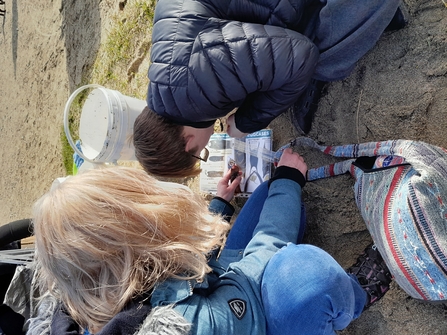
Challenge 3 - Take Action and Volunteer to Help Nature
For this challenge, you may want to put into action learning from the Skill Up challenge or continue with your citizen science projects as volunteering hours. For example, Seaquest or Shoresearch, or take time to improve your local patch or join local volunteering events or groups.
Volunteering Opportunities
- Search Volunteering Opportunities | Cornwall Wildlife Trust or Cornwall Wildlife Groups | Cornwall Wildlife Trust for volunteering opportunities with Cornwall Wildlife Trust.
- Your Shore Network - Cornwall has a thriving network of dedicated and skilled local marine volunteer groups all around its coastline, who look after and shout about their wonderful marine wildlife. With 18 groups to choose from, find your local group and get volunteering!
- There are over 900 plastic-free communities across the country, all taking action as individuals, businesses and communities to tackle plastic pollution. Join your local communities’ team of volunteers or join in on a beach clean.
- Become a Shoresearch volunteer to carry out intertidal surveys of your local rocky shore and help create a snapshot of the biodiversity that thrives within it (16+).
- If you are a recreational diver or snorkeler looking for a new challenge, Seasearch offers an exciting way to learn about marine life whilst doing your bit to protect and restore our oceans (18+).
- Write to your local MP.
- Campaign for Surfers Against Sewage to become an Ocean Activist.
Challenge 4 - Take the Lead and Run Your Own Event
As you come to the end of your award, you will have gained skills, experiences, and knowledge to help you be the best conservationist you can be! Now we would like you to use those skills to plan, organise and lead your very own event, either on your own or with others. This might be a child running a beach clean with their family or teaching them about an animal they love, a group of friends or youth group organising a fundraiser for a good cause, running an event with a local group or even an exhibition of artwork you have created.
More Information
Breaking it down into sections, you will need to think about and record the following:
- What are you going to do? The who, what, when, why and with whom.
- Plan how you are going to make it happen, thinking about things such as equipment needed, if you want to advertise, and most importantly, health and safety.
- Describe how the event went, such as how many people took part, any highlights for you or feedback from those that attended.
- Reflect on how you felt about taking the lead and what you learnt from the experience.
Challenge 5 - Your Wild Pledge
When you have completed all the other challenges, we would like you to think up your own Wild Pledge, this is a personal challenge you set yourself that will help make the world a wilder place.
Wild Pledge
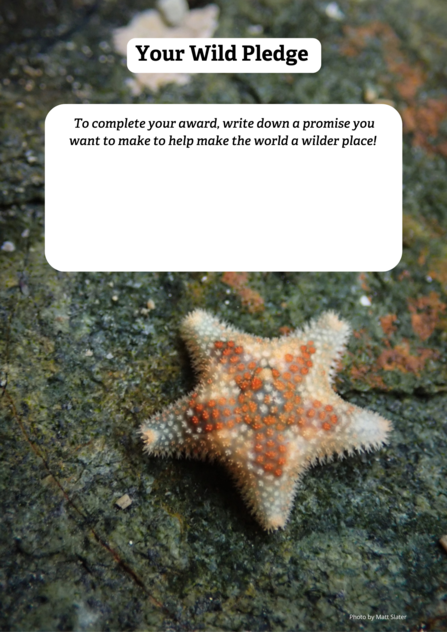
Who can sign off your activity logs?
If you are attending an organised event or session, ask one of the leaders to sign your booklet. If you are doing something in your own time there are lots of people you can ask to support you:
- Local Wildlife Trust officer
- Volunteer group leader
- Teacher
- Youth Worker
- Support Worker
- Parent

What can these people do to help participants complete the Your Shore award?
It depends on the individual or group taking part.
It may just be signing off completed activities but can include supporting participants to think about what they are interested in or signposting to different community organisations, websites and events (of which there are tips and guidance in the booklet).
If a someone is asking you to sign off activities for their award it’s great to ask questions such as what they thought of it, or if they learnt anything to so they can reflect on their experience.
What do you do when you have completed the Award?
Once the challenges are complete and recorded in the booklet, photograph or scan all eight written pages and email yourshore@cornwallwildlifetrust.org.uk, or post to the address at the bottom of the page.
Ensure you include your name, email address and postal address so we can thank you and send you a lovely certificate and badge!
If you are a group leader, you are welcome to send several at once and run your own award ceremony.
If you’d like some more advice about taking part in or delivering the award, please email yourshore@cornwallwildlifetrust.org.uk.
Thank you so much for joining us on the Your Shore Journey and taking a stand for nature.
Please send postal replies to;
Your Shore Award
Cornwall Wildlife Trust,
Five Acres,
Allet, Cornwall,
TR4 9DJ.

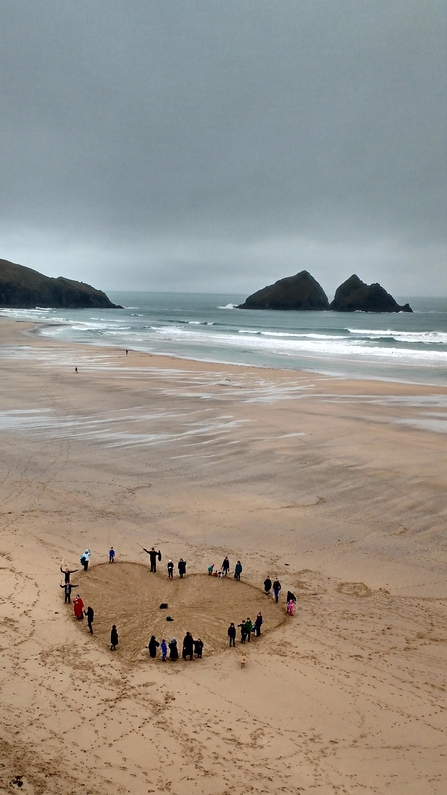
Heart in sand by Thomas Daguerre of Hydro Motion Media
